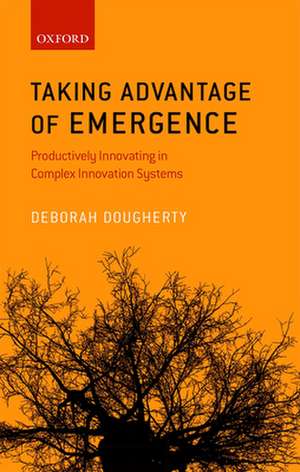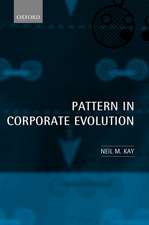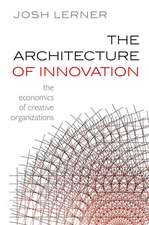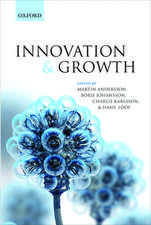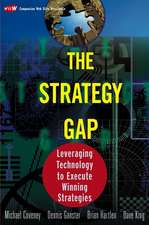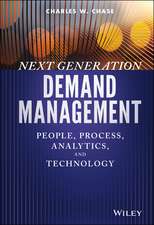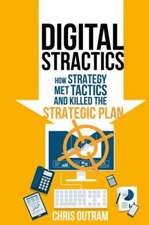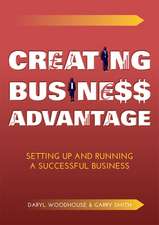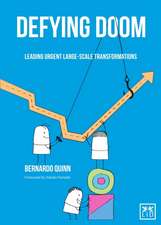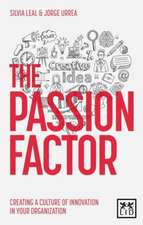Taking Advantage of Emergence: Productively Innovating in Complex Innovation Systems
Autor Deborah Doughertyen Limba Engleză Hardback – 25 feb 2016
Preț: 343.56 lei
Preț vechi: 475.05 lei
-28% Nou
Puncte Express: 515
Preț estimativ în valută:
65.75€ • 68.73$ • 55.56£
65.75€ • 68.73$ • 55.56£
Carte tipărită la comandă
Livrare economică 24 februarie-01 martie
Preluare comenzi: 021 569.72.76
Specificații
ISBN-13: 9780198725299
ISBN-10: 0198725299
Pagini: 174
Dimensiuni: 142 x 223 x 15 mm
Greutate: 0.33 kg
Editura: OUP OXFORD
Colecția OUP Oxford
Locul publicării:Oxford, United Kingdom
ISBN-10: 0198725299
Pagini: 174
Dimensiuni: 142 x 223 x 15 mm
Greutate: 0.33 kg
Editura: OUP OXFORD
Colecția OUP Oxford
Locul publicării:Oxford, United Kingdom
Recenzii
Professor Dougherty's Taking Advantage of Emergence is an outstanding addition to the literature on innovation. It combines a highly innovative theoretical framework with rich empirical analysis of modern innovation. It is rare to find a book that combines academic insight with such a clear articulation of ideas that is presented in a way that can be readily accessed by non-academics. The book is both rich and fascinating, and also an enjoyable read. Professor Dougherty avoids simplistic easy answers, but offers something much more valuable a framework for understanding how innovation emerges and how that emergence can be managed. I know of no other book that provides such an overview of the cutting edge of our field.
In this book, Deborah Dougherty offers a deeply pragmatic roadmap for addressing our most challenging social and technical problems through new modes of thinking and organizing. Complexity often seems like a curse, because it foils traditional methods of understanding. Through her extensive fieldwork and intensive scholarship, Dougherty has found an alternative: by enabling emergence, we enable discovery, and discovery provides the way forward.
This book is a brilliant epitome of what Debra Doughertys scholarship is best known: empirical richness and conceptual depth. Generating new knowledge in complex innovation systems, such as the making of new drugs, is hugely important both practically and theoretically. Doughertys sophisticated research not only sheds light on complex innovation but gives us a sophisticated vocabulary to better understand it. Her emphasis on the emergent character of innovation, on collective learning, and on abductive reasoning, to mention a few concepts, illuminates her rich empirical material. She writes for both scholars and practitioners, and this gives the book a freshness which is not always discernible in purely scholastic texts.
In this book, Deborah Dougherty offers a deeply pragmatic roadmap for addressing our most challenging social and technical problems through new modes of thinking and organizing. Complexity often seems like a curse, because it foils traditional methods of understanding. Through her extensive fieldwork and intensive scholarship, Dougherty has found an alternative: by enabling emergence, we enable discovery, and discovery provides the way forward.
This book is a brilliant epitome of what Debra Doughertys scholarship is best known: empirical richness and conceptual depth. Generating new knowledge in complex innovation systems, such as the making of new drugs, is hugely important both practically and theoretically. Doughertys sophisticated research not only sheds light on complex innovation but gives us a sophisticated vocabulary to better understand it. Her emphasis on the emergent character of innovation, on collective learning, and on abductive reasoning, to mention a few concepts, illuminates her rich empirical material. She writes for both scholars and practitioners, and this gives the book a freshness which is not always discernible in purely scholastic texts.
Notă biografică
Deborah Dougherty earned her PhD from the Sloan School of Management, M.I.T., and taught at Wharton (University of Pennsylvania) and McGill University prior to joining Rutgers University. Her current research focuses on complex innovation challenges, science-based innovation, and organizing for innovation. She has published more than 60 journal articles, book chapters, and essays, with more in the pipeline. She was elected Chair of the Technology and Innovation Division of the Academy of Management, served as Senior Editor for Organization Science for 7 years, and served or is now serving on the editorial boards of six other major academic journals.
